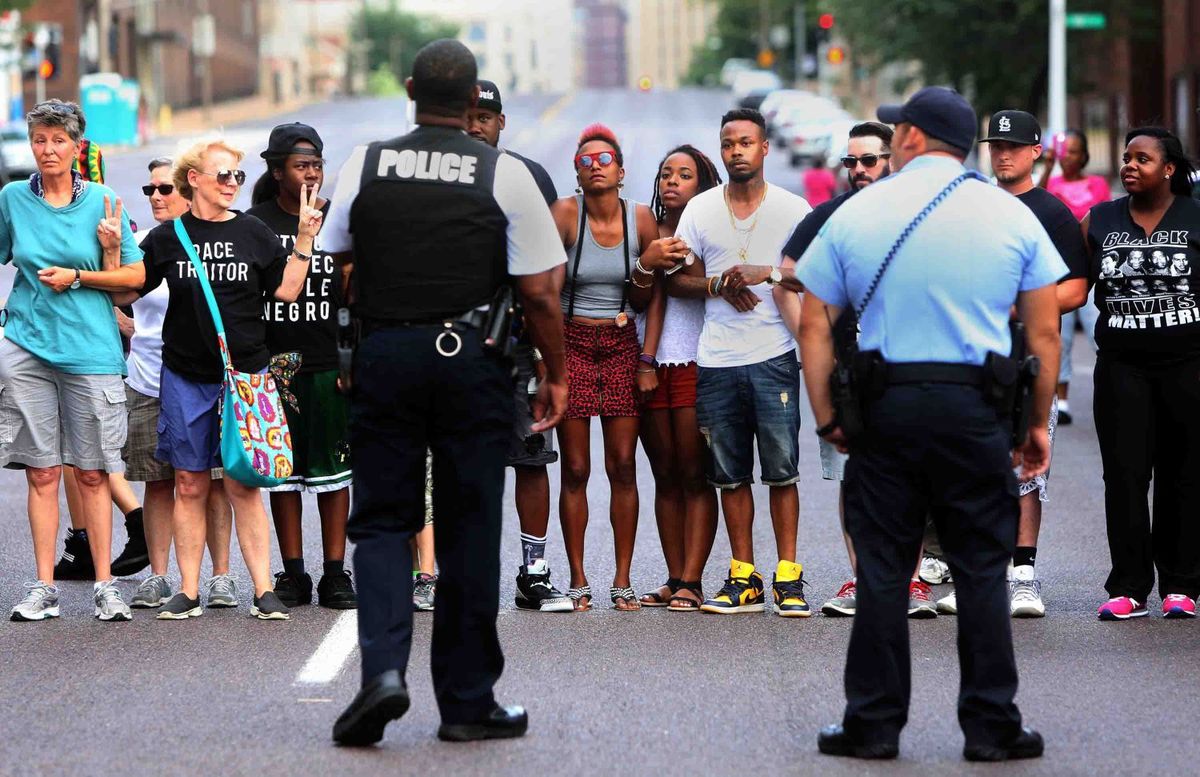![]()
Riots broke out in St. Louis earlier last month in protest of the acquittal of former St. Louis Police Officer Jason Stockley.
On Sept. 15, St. Louis Circuit Judge Timothy Wilson found Stockley innocent of first-degree murder against Anthony Lamar Smith. Immediately after the verdict was known more than 1,000 protesters took to the streets on a march toward the home of St. Louis Mayor, Francis Slay.
Mariah Christ, east St. Louis resident, and Graham Vogt, St. Louis University student, shared their views on the historic protests and recent events in the city.
“My experience with police officers in my area has always been positive. I, however, am a white female that does not do anything on the social scene that could become problematic with police officers,” Christ, John Brown University senior, said. “I understand the privilege I have in my race and socio-economic status and that the chance for biased treatment by police officers would not be likely for me. I did witness a lot of police arresting other people and students getting handcuffed for fighting on school grounds. I have seen people running away from a gas station where a stabbing happened. My brother was outside after school and a classmate pulled out a gun next to him. Although the student didn’t do anything, he was just showing off to his friends.”
St. Louis has a long-standing history of racial tensions, from Dred Scott in 1867 to Michael Brown in Ferguson in 2014.
“My first experience with protests was my senior year of high school. I was in Ferguson for a college night class at St. Louis Christian College. I was driving home and could see protesters and the beginning of the riots that are now well-known nationwide,” Christ said. “I was safely on my way home in my car and had no interaction with any of the violence. I did have friends that lived in the area that could feel the tear gas seeping in through the doors of their homes. I didn’t personally know anyone that was involved in the riots.”
According to AP, “more than 300 arrests have been made during protests since a judge’s mid-September acquittal.”
“The night before the case verdict came out, the apartment building I’m in, it’s a little bit off campus, they kind of sent like a letter to the residents that said, ‘Hey, this verdict is coming out. You might want to be on the look-out for protests in case they turn into riots’. . .it was kind of a surprise, but it definitely shows that people in the area and community were certainly aware of the possibility of violence or some unrest happening,” Vogt, St. Louis University junior, said. “That’s really all I heard about it until the morning of.”
“Personally, after reading some of the facts about the case and some of the reasons the judge ruled it the way he did, I certainly think that there’s a lot of injustice playing into that, and like the way the court handled it I think it could be improved,” Vogt said. “I just don’t see protests [as] the best way of going in to that.”
According to AP, riots broke out at the Galleria mall in St. Louis and more than twenty people were arrested.
“My first material run-in with the protests was when my laptop broke a couple days after that and I went to get it fixed at the apple store,” Vogt said. “I went to the apple store at the mall called the Galleria in St. louis and the mall was actually closed. . .They closed the mall, I mean, the police did, to keep it from being targeted.”
During the Ferguson riots in 2014, protesters camped out on SLU’s campus for almost a week. Students then presented the University with the clock tower accords.
“It’s a series of things that SLU would make an effort to change at the University. Like, increasing funding for the African American Studies department…They really still talk about it today,” Vogt said.
Sunday of the 2017 riots, protestors came to SLU’s campus. This time, however, the campus was only open to individuals with an SLU ID.
“There actually was like a student-led protest that actually came inside the student union and they came up with a review of the clock tower accords that they shared,” Vogt said. “There were a bunch of things. They wanted a full ride scholarship for the daughter of Anthony Lamar Smith.”
The American Civil Liberties Union filed a lawsuit against the St. Louis police department, which now will be handled by federal courts.
“What I didn’t expect was the way in which Black Lives Matter and other groups reacted,” Christ said. “They acted in peaceful protest, in the most respectful and non-violent manner. The police initiated the violence in the more recent events after the Stockley case. I am honestly proud of the Black Lives Matter community and others that chose to react in silence, lament, and peaceful and respectful dispute. I think there is so much to learn from their community on how to stand for justice. I think they modeled Jesus better than the church does.”





